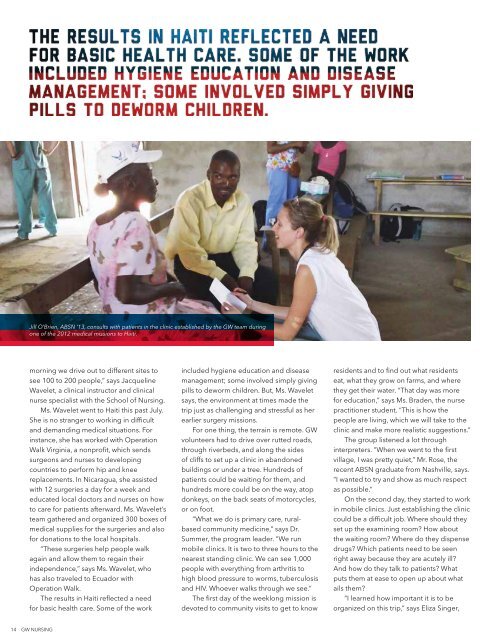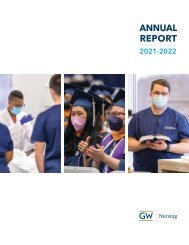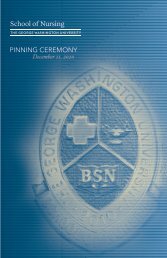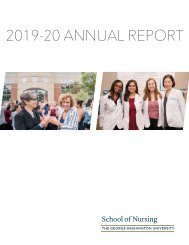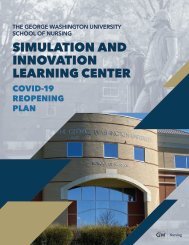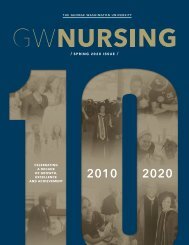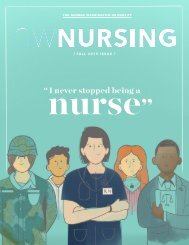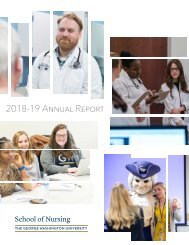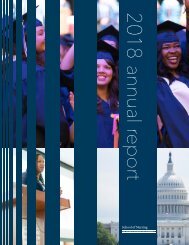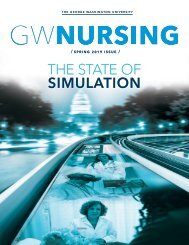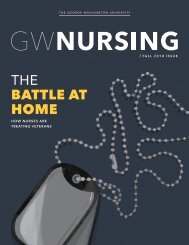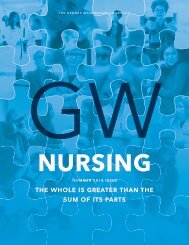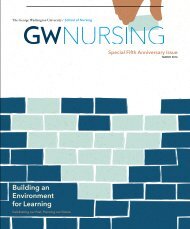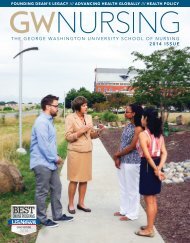GW Nursing Magazine Spring 2013
GW Nursing is a publication of the George Washington University School of Nursing. The magazine tells the story of GW nurses and their endeavors in the areas of education, research, policy and practice.
GW Nursing is a publication of the George Washington University School of Nursing. The magazine tells the story of GW nurses and their endeavors in the areas of education, research, policy and practice.
Create successful ePaper yourself
Turn your PDF publications into a flip-book with our unique Google optimized e-Paper software.
Jill O’Brien, ABSN ‘13, consults with patients in the clinic established by the <strong>GW</strong> team during<br />
one of the 2012 medical missions to Haiti.<br />
morning we drive out to different sites to<br />
see 100 to 200 people,” says Jacqueline<br />
Wavelet, a clinical instructor and clinical<br />
nurse specialist with the School of <strong>Nursing</strong>.<br />
Ms. Wavelet went to Haiti this past July.<br />
She is no stranger to working in difficult<br />
and demanding medical situations. For<br />
instance, she has worked with Operation<br />
Walk Virginia, a nonprofit, which sends<br />
surgeons and nurses to developing<br />
countries to perform hip and knee<br />
replacements. In Nicaragua, she assisted<br />
with 12 surgeries a day for a week and<br />
educated local doctors and nurses on how<br />
to care for patients afterward. Ms. Wavelet’s<br />
team gathered and organized 300 boxes of<br />
medical supplies for the surgeries and also<br />
for donations to the local hospitals.<br />
“These surgeries help people walk<br />
again and allow them to regain their<br />
independence,” says Ms. Wavelet, who<br />
has also traveled to Ecuador with<br />
Operation Walk.<br />
The results in Haiti reflected a need<br />
for basic health care. Some of the work<br />
included hygiene education and disease<br />
management; some involved simply giving<br />
pills to deworm children. But, Ms. Wavelet<br />
says, the environment at times made the<br />
trip just as challenging and stressful as her<br />
earlier surgery missions.<br />
For one thing, the terrain is remote. <strong>GW</strong><br />
volunteers had to drive over rutted roads,<br />
through riverbeds, and along the sides<br />
of cliffs to set up a clinic in abandoned<br />
buildings or under a tree. Hundreds of<br />
patients could be waiting for them, and<br />
hundreds more could be on the way, atop<br />
donkeys, on the back seats of motorcycles,<br />
or on foot.<br />
“What we do is primary care, ruralbased<br />
community medicine,” says Dr.<br />
Summer, the program leader. “We run<br />
mobile clinics. It is two to three hours to the<br />
nearest standing clinic. We can see 1,000<br />
people with everything from arthritis to<br />
high blood pressure to worms, tuberculosis<br />
and HIV. Whoever walks through we see.”<br />
The first day of the weeklong mission is<br />
devoted to community visits to get to know<br />
residents and to find out what residents<br />
eat, what they grow on farms, and where<br />
they get their water. “That day was more<br />
for education,” says Ms. Braden, the nurse<br />
practitioner student. “This is how the<br />
people are living, which we will take to the<br />
clinic and make more realistic suggestions.”<br />
The group listened a lot through<br />
interpreters. “When we went to the first<br />
village, I was pretty quiet,” Mr. Rose, the<br />
recent ABSN graduate from Nashville, says.<br />
“I wanted to try and show as much respect<br />
as possible.”<br />
On the second day, they started to work<br />
in mobile clinics. Just establishing the clinic<br />
could be a difficult job. Where should they<br />
set up the examining room? How about<br />
the waiting room? Where do they dispense<br />
drugs? Which patients need to be seen<br />
right away because they are acutely ill?<br />
And how do they talk to patients? What<br />
puts them at ease to open up about what<br />
ails them?<br />
“I learned how important it is to be<br />
organized on this trip,” says Eliza Singer,<br />
14 <strong>GW</strong> NURSING


